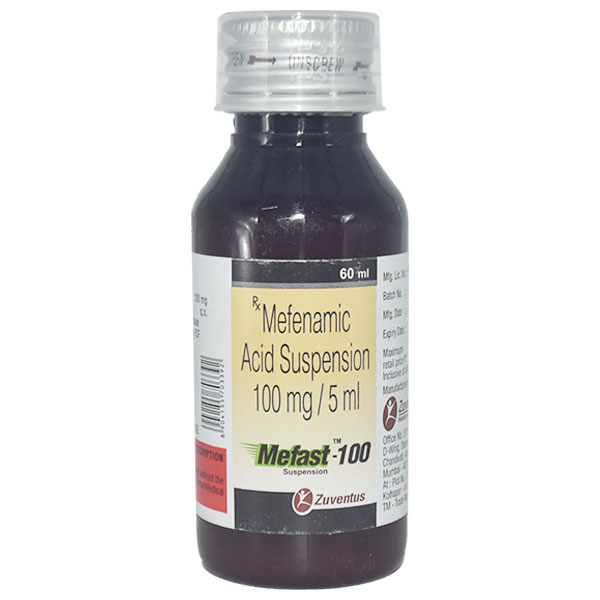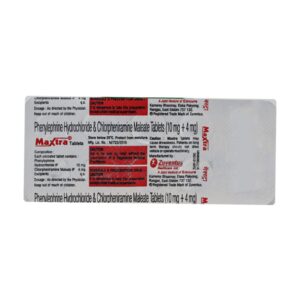Description
About Mefast 100 Suspension
Mefast 100 Suspension is indicated for the symptomatic treatment of fever in children above six months. It is also useful for relieving mild to moderate pain in children.
Mefast 100 Suspension contains ‘Mefenamic acid’, which works by blocking the effect of chemical messengers that cause pain and fever. Thus, Mefast 100 Suspension helps relieve fever and pain.
In some cases, Mefast 100 Suspension may cause side effects such as abdominal pain, nausea, vomiting, diarrhoea, and flatulence. Most of these side effects do not require medical attention and will resolve gradually over time. However, if the side effects persist or worsen, please consult your doctor.
Let your doctor know if your child has asthma, active ulcers, pre-existing renal disease, or chronic inflammation of the upper/lower gastrointestinal tract. Keep your doctor informed about your child’s health condition and medications to rule out any side effects/interactions.
Uses of Mefast 100 Suspension
Medicinal Benefits
Mefast 100 Suspension belongs to a group of medicines called NSAIDs (Non-Steroidal Anti-Inflammatory Drugs) indicated for the symptomatic treatment of fever in children above six months. It is also useful for the relief of mild to moderate pain in children. Mefast 100 Suspension contains ‘Mefenamic acid’, which works by inhibiting the cyclooxygenase enzyme, which is responsible for the formation of prostaglandins. Thus, Mefast 100 Suspension helps relieve fever and pain.
Directions for Use
Storage
Side Effects of Mefast 100 Suspension
- Nausea
- Vomiting
- Diarrhoea
- Flatulence
Drug Warnings
Mefast 100 Suspension should not be given to the child if they are allergic to any of its components or have pre-existing asthma, aspirin-sensitive asthma, active ulceration, chronic inflammation of the upper/lower gastrointestinal tract, or pre-existing renal disease. Inform your doctor if the child has cardiovascular problems, hypertension, congestive heart failure, oedema, gastrointestinal ulceration, bleeding or perforation, asthma, or kidney or liver problems. Let your doctor know if the child is on other medications, including supplements or herbal products.
Drug Interactions
Drug-Drug Interactions: Inform the doctor if your child is taking ACE inhibitors, pain killers (aspirin), diuretics, antimanic (lithium), anti-metabolites (methotrexate), anticoagulants (warfarin), or antacids.
Drug-Food Interactions: No interactions found/established.
Drug-Disease Interactions: Inform the doctor if your child has pre-existing asthma, aspirin-sensitive asthma, active ulceration, chronic inflammation of the upper/lower gastrointestinal tract, or pre-existing renal disease.
Drug-Drug Interactions Checker List
- ASPIRIN
- LITHIUM
- METHOTREXATE
- WARFARIN
Habit Forming
Diet & Lifestyle Advise
- Keep your child well-rested.
- Include healthy vegetables, fruits and whole grains in their diet.
- Break down the meals into smaller portions and feed the child at regular intervals.
- Encourage the child to drink plenty of water.
- Help your child to focus on a healthy diet, adequate sleep and physical activity.
Disease/Condition Glossary
Pain: It is a term used to describe any unpleasant feeling or discomfort. It occurs due to nerve damage (in cases of backache, toothache, or muscle pain) or persistent stimulation (in headaches or migraine). Pain may vary from mild to severe, depending on the underlying condition.
Fever: When the body’s temperature goes above 100.4°F (38°C), it is called fever or pyrexia. It is an abnormal increase in body temperature from normal (98.6°F) due to infection, chemotherapy or disease conditions.
Safety Advice
Alcohol
NOT APPLICABLE
–
Pregnancy
NOT APPLICABLE
–
Breast Feeding
NOT APPLICABLE
–
Driving
NOT APPLICABLE
–
Liver
CAUTION
Please consult a doctor if your child has a liver impairment or if you have any concerns regarding this.






Reviews
There are no reviews yet.